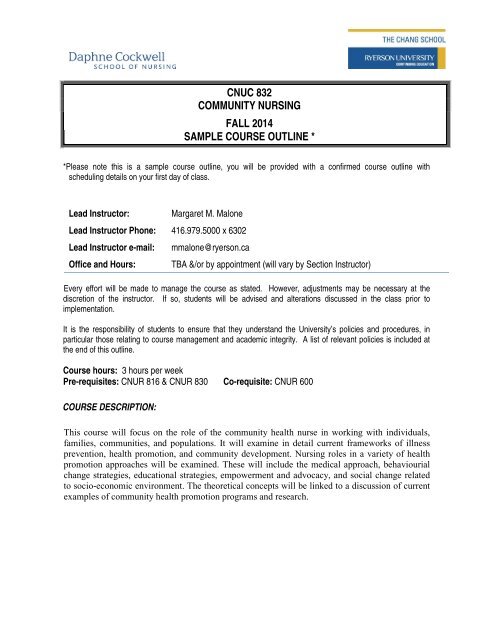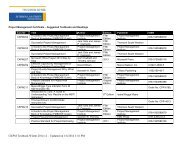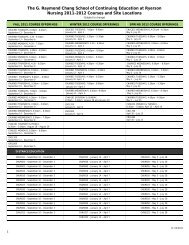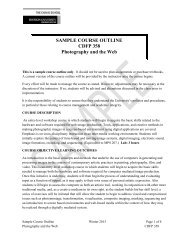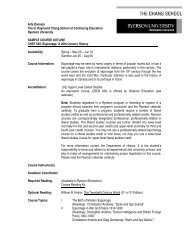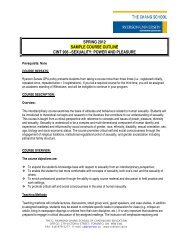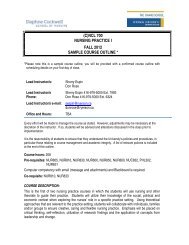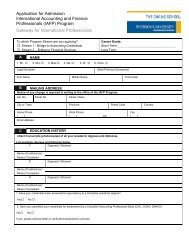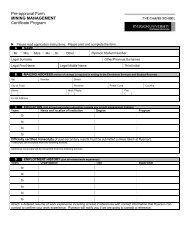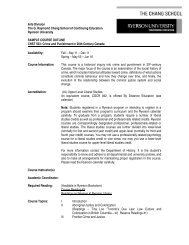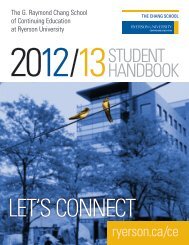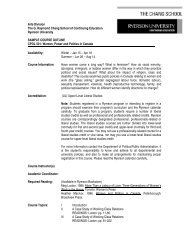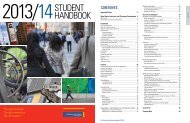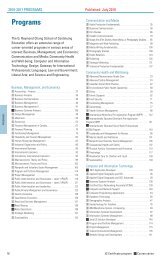Sample Classroom Course Outline - The Chang School - Ryerson ...
Sample Classroom Course Outline - The Chang School - Ryerson ...
Sample Classroom Course Outline - The Chang School - Ryerson ...
Create successful ePaper yourself
Turn your PDF publications into a flip-book with our unique Google optimized e-Paper software.
presentations, and, where relevant, participation in discussion board, plus a final examination toenhance teaching and learning, i.e., unless otherwise informed.* Both versions of this course will be conducted though the Blackboard course managementsystem, inclusive of the web-based modules using WebCT.Note: <strong>The</strong> use of computers and the internet for literature searches and management, and forcommunication and discussion board course related activities, are essential basic skills for all youracademic work. <strong>The</strong>refore, students must have regular access to a computer, with MicrosoftOffice, inclusive of Microsoft Word software internet and Google Chrome.1. Post Diploma Day and Continuing Education <strong>Course</strong>s: Hybrid VersionAll components of this course contain a hybrid of the conventional in-class and online course deliverymodes. <strong>The</strong> online component is delivered via Blackboard course management system whilescheduled in-class time may consist of a combination of informal lectures, small group work, casestudyanalyses, critical debates, related discussions emerging from posted critical questions, andaudio-visual materials as determined by each instructor.2. Post Diploma Distance Education <strong>Course</strong>: Fully OnlineAll components of the course consist of a fully online course delivery modality, via Blackboard. We willintegrate a combination of on-line course related discussions, on-line group discussions, e.g., criticalanalysis of posted critical questions, problem-based case studies, and audio-visual materials etc., asdetermined by each instructor.COURSE OBJECTIVE/LEARNING OUTCOMES:By the end of this course the student will be able to:• Examine critically concepts of health, community, community health, healthy community, socialdeterminants of health, health promotion, community development, empowerment, health literacy,health equity, social justice, and community health nursing.• Appraise the Canadian Community Health Nursing Standards of Practice and the Public HealthNursing Discipline Specific Competencies for their relevance to addressing health inequities anddisparities, and social determinants of health in community health nursing theory and practice.• Consider critically socially organized health inequities and disparities in Canada, locally, provincially,and nationally.• Examine the concepts and evidences regarding the social determinants of health from differingperspectives.• Investigate the interconnections and impacts of the broad social determinants of health, includinggender, race, ethnicity, culture, class, age, sexuality, ability, religion, and culture in relation toexisting health inequities and disparities and to community health nursing competencies andpractice.3 | Page
• Analyze community health nursing issues framed by critical theory/ies, an analysis that addressesthe intersections of gender, race, class, ethnicity, age, sexuality, ability, culture, among othervariables, together cultural safety and social justice.• Reflect critically upon nursing practice within health care institutions as they relate to communityhealth nursing theory and practice.• Critique a range of philosophical and theoretical approaches and strategies for health promotionwithin the context of community health nursing.• Examine critically concepts of community assessment, program planning, and evaluation as theyrelate to community health promotion.• Explore community development and community-based participatory research as dynamic ways toengage communities in addressing and reducing health inequities and disparities.• Investigate ethical issues and considerations for real community participation and empowermenttogether with their implications for health promotion and community nursing practice.• Unpack and analyze critically common assumptions, myths, misconceptions, and stereotypes aboutsocially excluded, marginalized, and/or at-risk populations.• Examine critically socially excluded, marginalized, and/or at-risk populations with attention to thebroad social determinants of health within social, political, cultural, and economic contexts.• Engage in a process of applying critically concepts of community assessment, health promotingprogram planning, and evaluation relevant to a community health issue/s and population.• Working with community development approaches, design a community based, theoreticallyinformed, political action project that will effect change in health damaging conditions whilefacilitating and enabling health equity and social justice.Note-1: See FULL COURSE OUTLINE posted on Blackboard in “<strong>Course</strong> Materials” for specificobjectives for each module.Note-2: See FULL COURSE OUTLINE posted on Blackboard for any changes in “RequiredReadings” and/or “Methods of Evaluation” as each term begins.4 | Page
METHOD AND SCHEDULE OF STUDENT EVALUATION:Methods of Evaluation:Academic Integrity and Plagiarism: Policies related to academic integrity and plagiarism will beenforced. Students must refer to information on this and other related policies in the <strong>School</strong> of NursingStudent Handbook, <strong>Ryerson</strong> University Calendar, and the websites noted below.* See the <strong>Ryerson</strong> University Student Handbook for academic considerations for tests andexams. ** Requests for changes of test dates for vacation schedules will not be considered.AssignmentsValueParticipation 15% Weekly &/or by unit (as per each instructor)(On-line; Hybrid & In-ClassDueCritical Analysis Paper 15% Week 4Community Assessment 10% Week 7Community Development, 25% 11 &/or 12 (as per each instructor)Political Action ProjectFinal Examination 35% Final Exam Week/s Week 13:[Specific time and dates TBA].RU Full-time section/s: See RU Exam schedule._________________________________________________________________________________Note: Be sure to discuss any concerns about your papers and/or assignmentswith your instructor well in advance of the due date/s.=======================================================MISSED TERM WORK OR EXAMINATIONS:Students are expected to complete all tests, and exams within the identified time frames and by thedates indicated in this outline and these dates/ times and the course syllabus that will be provided day1 of class.Consideration for a deferral of a term test, or final examination is only permitted for a medical orpersonal emergency or due to religious observance (for the latter, requests must be received withinthe first two weeks of the course).<strong>The</strong> instructor must be notified by e-mail prior to the test/exam date, and the appropriatedocumentation must be submitted.For absence on medical or religious observance grounds, official forms may be downloaded from the<strong>Ryerson</strong> website at www.ryerson.ca/undergraduate/currentstudents/forms5 | Page
Scheduled Hours:1. Hybrid Version: 2 hours per week in class: 1 hour per week online and/or as arranged by your instructor.2. Distance Education Version – Fully Online: 3 hours per week on-lineAll components of the course consist of a fully online course delivery modality, via Blackboard.Note-1: If needed, i.e., depending on the enrollment, some classes may be replaced by fully online.Note-2: To contribute to both individual & collective learning, each week students are expected to(i) Read the weekly required readings(ii) Participate by demonstrating your critical engagement with the required reading in your weekly online,and/or in class discussions with your class colleagues.* All ‘required readings’ and assignments are essentially same in each course delivery method.1) Hybrid Version:2) Distance Education Version:All components of the course contain a hybrid of conventional in-class and online course deliverymodes. <strong>The</strong> online component is delivered via Blackboard course management system whilescheduled in-class time may consist of a combination of lectures, tutorial, small group work, tests, andexams as determined by each instructor.COURSE SCHEDULE:ClassModule 1Module 2Module 3Module 4Module 5TopicsUnit 1: Community Health Nursing (CHN): Concepts, Politics, Research, <strong>The</strong>ories,Frameworks, & Approaches (Modules 1 to 4)Community health nursing concepts & practice: What are some of the majorconcepts relevant to community health & community health nursing practice?Research: What determines health &/or health inequities & disparities?Please review briefly the Selected Topics (M-9) and Selected Issues (M-10).<strong>The</strong>ory: What theoretical frameworks best guide CHN practice for population groupsmore at risk to health inequalities & disparities?Health promotion models & approaches: What health promotion models &approaches help to frame, enable, & promote health & wellness?Unit 2: Working with Communities: Community Organizing, Capacity Building,Creating Supportive Environments, & StrengtheningCommunity Action (Modules 5 to 8)Community health assessment or “healthy” community assessment? Ethicalconsiderations: Whose community? Whose health? Whose assessment?BREAK WEEKNO CLASSES6 | Page
Module 6Module 7Module 8Module 9Module 10Module 11 & 12Module 13Program planning & evaluation: What program planning models & approaches aremost effective in reducing health inequities and disparities while promoting health?Community development, community-based participatory research (CBPR), &political action for “healthy” social change: How do we collaborate with communitiesin addressing and reducing health inequities & disparities while promoting health?Health promoting & empowering communication: What health literacy, information,education, & communication strategies central to empowerment will increase people’scontrol over their health & that of their community/ies?Unit 3: Socially Excluded, Marginalized, &/or At-Risk Populations in theCommunity: Converging Social Determinants of Health (Modules 9 to10)Addressing & reducing health inequities & disparities for selected sociallyexcluded, marginalized, &/or at-risk populations: Disabled Peoples; SexualMinorities; Aboriginal Peoples; Immigrants & Refugees; Older Adults.Selected issues: Violence; Poverty; Homelessness; Disability; Mental HealthUnit 4: Moving into the future: <strong>The</strong>ory to practice - Promoting health equity& social justice in communities (Modules 11 & 12)Visions for shaping the future: How can CHNs act to transform health care politics,policies, funding, & practice to promote health equity and social justice for all?Political action presentations & review[* <strong>The</strong> activities for modules 11 & 12 may be dependent on the size of the class & timeavailable for presentations]WEEK OF FINAL EXAM (Exception: Full Time students - as per RU exam schedule)Expectations of StudentsPlease refer to: <strong>Ryerson</strong> University, Daphne Cockwell <strong>School</strong> of Nursing, Post Diploma Degree Program,Student Handbook, 2014-2015. Website: http://www.ryerson.ca/nursing<strong>Course</strong> Policies:1. Student Code of Conduct: Students must be familiar with and abide by all University and <strong>School</strong> ofNursing policies including the “Student Code of Academic Conduct”, the “Student Code of Non-Academic Conduct” and “Professional Conduct”. A student may be WITHDRAWN from the nursingprogram for reasons of unprofessional behaviour or professional misconduct.2. All students are required to activate and maintain a <strong>Ryerson</strong> Matrix email account and access<strong>Ryerson</strong> mail on a regular basis.3. Students need to inform faculty of any situation that arises during the semester which may have anadverse effect upon their academic performance and that they must request any necessaryconsiderations (e.g., medical or compassionate), or accommodations [e.g., religious observance,disability (should be registered with the Access Centre), etc.] according to policies and well in advance.Failure to do so will jeopardize any academic appeals.7 | Page
4. Turnitin, an electronic plagiarism detection service, may be used. Students who do not want theirwork submitted to this plagiarism detection service must, by the end of the second week of class,consult with the instructor to make alternate arrangements. When an instructor has reason to suspectthat an individual piece of work has been plagiarized, the instructor shall be permitted to submit thatwork to any plagiarism detection service.You will be expected to submit your paper through the Turnitin system. Details of how to submit yourpaper will be provided in week 1.5. All students enrolled in the Post Diploma Degree Completion Program in Nursing must have valid orpending registration with the College of Nurses of Ontario (CNO). Students are required to notifythe <strong>School</strong> of Nursing of any change in CNO registration status. Failure to attain/maintain CNOregistration will result in WITHDRAWAL from the Nursing course(s) and a REQUIRED TO WITHDRAWstatus from the program. <strong>The</strong> exception to the policy of CNO registration are those students from anapproved bridging program.6. Requests for accommodation of specific religious or spiritual observance must be presented to theinstructor no later than two weeks prior to the conflict in question (in the case of final examinationswithin two weeks of the release of the examination schedule). In extenuating circumstances thisdeadline may be extended. If the dates are not known well in advance because they are linked to otherconditions, requests should be submitted as soon as possible in advance of the required observance.Given that timely requests will prevent difficulties with arranging constructive accommodations,students are strongly encouraged to notify instructors of an observance accommodation issue withinthe first two weeks of classes. To facilitate timely requests and decision making, the University will takeall practical steps to ensure that students and instructors are aware of the policy and relatedobservance issues.7. All policies can be found at http://www.ryerson.ca/senate/policies/index.htmlStudents are expected to be familiar with all University and <strong>School</strong> of Nursing policies concerning academicperformance (e.g., academic misconduct, submission of late assignments, etc.) and academic integrity.Please refer to the Post Diploma Degree Nursing Program Student Handbook and to the <strong>Ryerson</strong> UniversityCalendar for detailed information regarding academic policies and academic integrity.Professionalism in our Learning CommunityStudents and faculty within the school of nursing are colleagues in nursing. All members of ourlearning community are expected to act with professionalism and academic integrity.Honesty is the basic hallmark of academic integrity (http://www.ryerson.ca/~acadpol/policies.html). Communitymembers are expected to credit others’ ideas in written work, make a fair contribution to group work, andbehave with integrity during tests and exams. Trust, respect and fairness are values that underpin effectivecollaboration and life-long learning (<strong>The</strong> Center for Academic Integrity, 1999). <strong>The</strong> <strong>Ryerson</strong>, Centennial, GeorgeBrown Collaborative Nursing Degree program and <strong>The</strong> <strong>Ryerson</strong> Post RN Nursing Degree Program expectstudents to listen to one another’s viewpoints and to be respectful in communication. Students are required toattend all classes and labs, to be prepared, to be on time and to give adequate notice if circumstances preventthem from attending. Positive collegial professional relationships between students and faculty memberscontribute to excellence in both nursing education and nursing practice.“<strong>The</strong> Recipient of Health Care is Considered the End Goal of Nursing Education.” (Final CandidacyReport, 2004, p. 13).Post Diploma Degree students must also maintain their College of Nurses registration.8 | Page
Storch, J. L., Wagner, S., & Berry, L. (2004). Final Candidacy Report of the Review Team of the CanadianAssociation of <strong>School</strong>s of Nursing for the <strong>Ryerson</strong>, Centennial, George Brown Collaborative NursingDegree Program. Toronto: Canadian Association of <strong>School</strong>s of Nursing<strong>The</strong> Center for Academic Integrity. (1999). <strong>The</strong> fundamental values of academic integrity: honesty, trust,respect fairness, responsibility [pdf file]. Retrieved from http://www.academicintegrity.org/Students with disabilities that require academic adaptations or services may discuss their needs with thecourse instructor and/or contact the Student Services Access Centre, 285 Victoria Street, BUS-lower level and350 Victoria Street, JOR-300; phone: (416) 979-5290 (voice), (416) 979-5274 (TDD/TTY), fax: (416) 979-5094;e-mail: accesctr@ryerson.ca Those with learning disabilities or attention deficit disorders may contact theAccess Centre Annex at 55 Gould St., lower level, also at (416) 979-5290.Note: Promotion PoliciesStudents must achieve a grade of 'C' or above in all nursing theory and practice courses (all NCL, NUC, NURcourses) in order to be eligible to enroll in nursing courses in subsequent semesters.Students who earn a grade of 'C-' or below in any nursing theory or practice course will be given aPROBATIONARY Standing regardless of their overall GPA.Students will remain on PROBATION until they receive a grade of 'C' or above in all nursing courses.Students on PROBATION who earn a grade of 'C-' or below in a nursing theory course other than the nursingtheory course(s) in which they previously obtained a grade of 'C-' or below, OR who receive a first time 'C-' orbelow in a nursing practice course, will be given a REQUIRED TO WITHDRAW status.Students who receive a second grade of 'C-' or below in the same nursing theory course (either a repeated orsubsequent practice course) will result in a PERMANENT PROGRAM WITHDRAWAL Standing. This variationwill be enacted even when the student has taken less than three courses and has not acquired a cumulativegrade point average.At any point during the academic year, the <strong>School</strong> of Nursing reserves the right to terminate a student’sexperience in a nursing practice setting when patterns of behaviour place self, clients or others at risk. This willresult in the student receiving an 'F' grade for the course. In this circumstance, students shall have establishedrights of appeal; however, they cannot remain in the course while the appeal is underway. <strong>The</strong> appeal will beconducted promptly in order to protect students' rights.<strong>The</strong> student may be assigned PERMANENT PROGRAM WITHDRAWAL from the Nursing program for reasonsof unprofessional behaviour or professional misconduct.All nursing theory courses must be completed within five years of the prerequisite professional course. (Forexample, no more than five years can elapse between completion of Year 1 professional courses andenrollment in Year 2 professional courses.)9 | Page


